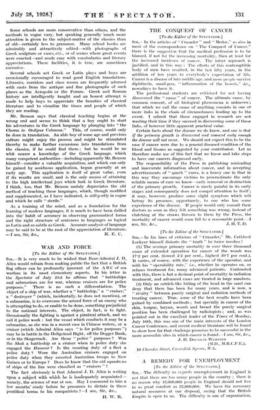WAR AND FORCE [To the Editor of the SPECTATOR.]
SIR,—It is very much to be wished that Rear-Admiral J. D. Allen would refrain from making public the fact that a British flag officer can be profoundly ignorant of the A B C of sea warfare in its 'most elementary aspects. In his letter in the Spectator of July 21st he affirms that " battleships and submarines are for war, whereas cruisers are for police purposes." There is no such a differentiation. The object of a ship of war, whether a " battleship," a " cruiser," a " destroyer " (which, incidentally, he does not mention), or a submarine, is to overcome the armed force of an enemy who is attempting to do, or enable to be done, something prejudicial to the national interests. The object, in fact, is to fight. Occasionally the fighting is against a piratical attack, and we call it police work : but the vessel which conducts it may be a submarine, as she was in a recent case in Chinese waters, or a cruiser (which Admiral Allen says " is for police purposes ") may be in battle in the Heligoland Bight, off the Dogger Bank, or in the Skagerrack. Are those " police " purposes ? Was the Shah a battleship or a cruiser when in police duty she engaged the Huascar ? Is the scouting duty of a fleet a police duty ? Were the Australian cruisers engaged on police duty when they escorted Australian troops to New Guinea or to Europe ? Does he know that the old squadrons of ships of the line were classified as " cruisers " ?
The fact obviously is that Admiral J. D. Allen is writing Upon a subject with which he is inadequately acquainted— namely, the science of war at sea. May I commend to him a few months' study before he presumes to dictate in these pontifical terms to his compatriots ?—I am, Sir, &c.,
H. W. R.




































 Previous page
Previous page